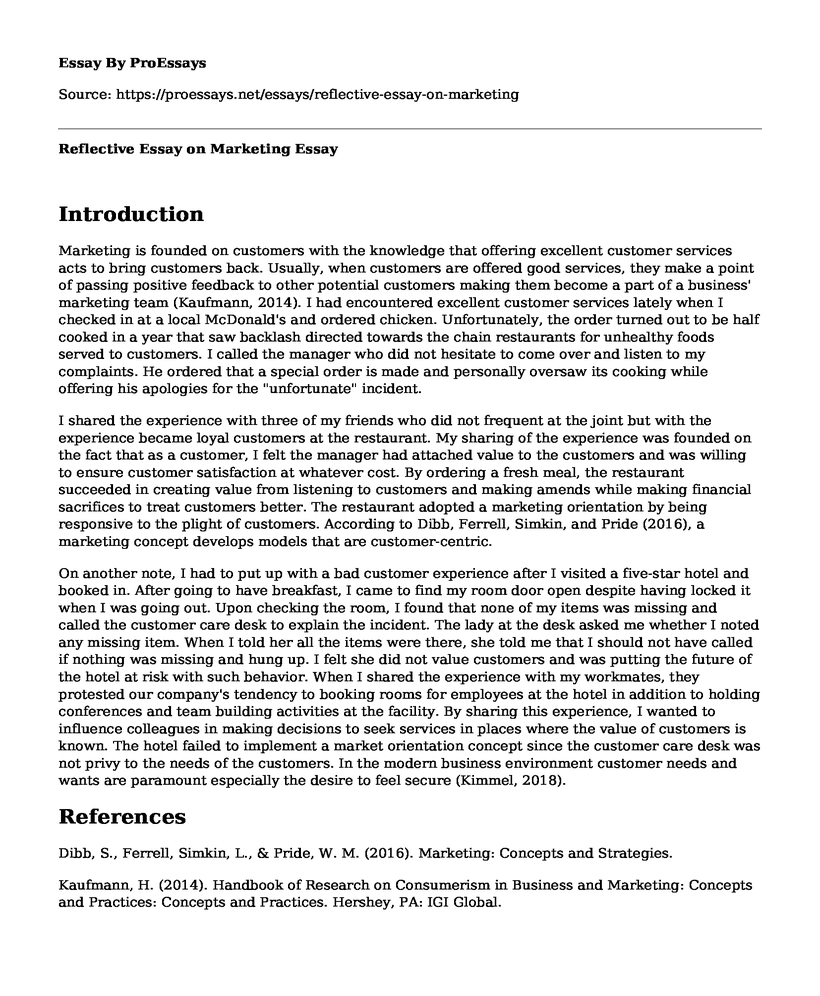Introduction
Marketing is founded on customers with the knowledge that offering excellent customer services acts to bring customers back. Usually, when customers are offered good services, they make a point of passing positive feedback to other potential customers making them become a part of a business' marketing team (Kaufmann, 2014). I had encountered excellent customer services lately when I checked in at a local McDonald's and ordered chicken. Unfortunately, the order turned out to be half cooked in a year that saw backlash directed towards the chain restaurants for unhealthy foods served to customers. I called the manager who did not hesitate to come over and listen to my complaints. He ordered that a special order is made and personally oversaw its cooking while offering his apologies for the "unfortunate" incident.
I shared the experience with three of my friends who did not frequent at the joint but with the experience became loyal customers at the restaurant. My sharing of the experience was founded on the fact that as a customer, I felt the manager had attached value to the customers and was willing to ensure customer satisfaction at whatever cost. By ordering a fresh meal, the restaurant succeeded in creating value from listening to customers and making amends while making financial sacrifices to treat customers better. The restaurant adopted a marketing orientation by being responsive to the plight of customers. According to Dibb, Ferrell, Simkin, and Pride (2016), a marketing concept develops models that are customer-centric.
On another note, I had to put up with a bad customer experience after I visited a five-star hotel and booked in. After going to have breakfast, I came to find my room door open despite having locked it when I was going out. Upon checking the room, I found that none of my items was missing and called the customer care desk to explain the incident. The lady at the desk asked me whether I noted any missing item. When I told her all the items were there, she told me that I should not have called if nothing was missing and hung up. I felt she did not value customers and was putting the future of the hotel at risk with such behavior. When I shared the experience with my workmates, they protested our company's tendency to booking rooms for employees at the hotel in addition to holding conferences and team building activities at the facility. By sharing this experience, I wanted to influence colleagues in making decisions to seek services in places where the value of customers is known. The hotel failed to implement a market orientation concept since the customer care desk was not privy to the needs of the customers. In the modern business environment customer needs and wants are paramount especially the desire to feel secure (Kimmel, 2018).
References
Dibb, S., Ferrell, Simkin, L., & Pride, W. M. (2016). Marketing: Concepts and Strategies.
Kaufmann, H. (2014). Handbook of Research on Consumerism in Business and Marketing: Concepts and Practices: Concepts and Practices. Hershey, PA: IGI Global.
Kimmel, A. J. (2018). Psychological Foundations of Marketing: The Keys to Consumer Behavior. London, England: Routledge.
Cite this page
Reflective Essay on Marketing. (2022, Nov 19). Retrieved from https://proessays.net/essays/reflective-essay-on-marketing
If you are the original author of this essay and no longer wish to have it published on the ProEssays website, please click below to request its removal:
- The Impact of Innovations on Apple's Sales Staff
- The Role of Ethics in the Movement of Goods and Supply Chain Essay
- Reasons People Resist Organizational Change Paper Example
- Plan to Resolve the Ransomware Attack in Our Organization Paper Example
- Analyzing the Internal Organization Paper Example
- Essay Example on Life Comes at You Fast: How Billboard Ads Catch My Attention
- Reimbursement: Key To Healthcare Revenue Cycle Mgmt - Essay Sample







